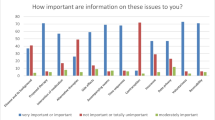Abstract
Background. Accepted practices of informed consent often result in suboptimal patient understanding of research studies.Methods. This pilot study aimed to assess trial-specific tailored materials, compared to a widely used generic booklet about clinical trials, randomly assigned to 118 candidates for cancer clinical trials. Study outcomes were: satisfaction with decision-making; satisfaction with materials; and subjective understanding of the clinical trial.Results. There were no major differences between groups. Participants rated tailored materials higher as a useful reference.Conclusions. Trial-specific materials hold utility for reference during clinical trials. Studies of informed consent are feasible, although important factors limit research.
Similar content being viewed by others
References
Ellis P. Attitudes towards and participation in randomized clinical trials in oncology: a review of the literature. Ann Oncol. 2000;11:939–945.
Cox K. Informed consent and decision-making: patients’ experiences of the process of recruitment to phases I and II anti-cancer drug trials. Patient Educ Couns. 2002;46:31–38.
Schutta K, Burnett C. Factors that influence a patient’s decision to participate in a phase I cancer clinical trial. Oncol Nurs Forum. Oct. 2000;27:1435–1438.
Joffe S, Cook E, Cleary P, et al. Quality of informed consent in cancer clinical trials: a cross-sectional survey. Lancet. 2001;358:1772–1777.
Daugherty C. Ethical issues in the development of new agents. Invest New Drugs 1999;17:145–153.
McCabe M. The ethical foundation of informed consent in clinical research. Semin Oncol Nurs. 1999;15:76–80.
Hietanen P, Aro AR, Holli K, et al. Information and communication in the context of a clinical trial. Eur J Cancer. 2000;36:2096–2104.
Featherstone K, Donovan JL. Random allocation or allocation at random? Patients’ perspectives of participation in a randomised controlled trial [comment]. BMJ. 1998;317:1177–1180.
Edwards SJ, Lilford RJ, Hewison J. The ethics of randomised controlled trials from the perspectives of patients, the public, and health-care professionals. BMJ. 1998;317:1209–1212.
Schaeffer MH, Krantz DS, Wichman A, et al. The impact of disease severity on the informed consent process in clinical research. Am J Med. 1996;100:261–268.
Cox K. Informed consent and decision-making: patients’ experiences of the process of recruitment to phases I and II anti-cancer drug trials. Patient Educ Couns. 2002;46:31–38.
Huizinga GA, Sleijfer DT, van de Wiel HB, et al. Decision-making process in patients before entering phase III cancer clinical trials: a pilot study. Cancer Nurs. 1999;22:119–125.
Coyne CA, Xu R, Raich P, et al. Randomized, controlled trial of an easy-to-read informed consent statement for clinical trial participation: a study of the Eastern Cooperative Oncology Group. J Clin Oncol. 2003;21:836–842.
Aaronson N, Visser-Pol E, Leenhouts G, et al. Telephone-based nursing intervention improves the effectiveness of the informed consent process in cancer clinical trials. J Clin Oncol. 1996;14:984–996.
Kreuter MK, Farrell D, Olevitch L, Brennan L. Tailoring Health Messages: Customizing Communication with Computer Technology. Mahwah, NJ: Lawrence Erlbaum Associates; 2000.
Rimer B, Glassman B. Is there a use for tailored print communications in cancer risk communication? J Natl Cancer Inst. 1999;25:140–148.
National Institutes of Health. Taking Part in Clinical Trials: What Cancer Patients Need To Know [booklet]. Washington, DC: USDepartment of Health & Human Services; 1998.
Holmes-Rovner M, Kroll J, Schmitt N, et al. Patient satisfaction with health care decisions: The Satisfaction with Decision Scale. Medical Decis Making. 1996;16:58–64.
Joffe S, Cook E, Cleary P, et al. Quality of informed consent: a new measure of understanding among research subjects. J Natl Cancer Inst. 2001;93:139–147.
O’Connor AM, Stacey D, Entwistle V, et al. Decision aids for people facing health treatment or screening decisions [update of Cochrane Database Syst Rev. 2001;(3):CD001431; PMID: 11686990]. Cochrane Database Syst Rev. 2003:CD001431.
American Society of Clinical Oncology. American Society of Clinical Oncology policy statement: Oversight of clinical research. J Clin Oncol. 2003;21:2377–2386.
Author information
Authors and Affiliations
Corresponding author
Additional information
Supported by the Dana-Farber Cancer Institute.
Rights and permissions
About this article
Cite this article
Wray, R.J., Stryker, J.E., Winer, E. et al. Do cancer patients fully understand clinical trial participation? A pilot study to assess informed consent and patient expectations. J Canc Educ 22, 21–24 (2007). https://doi.org/10.1007/BF03174370
Issue Date:
DOI: https://doi.org/10.1007/BF03174370



